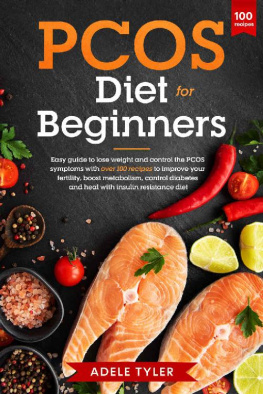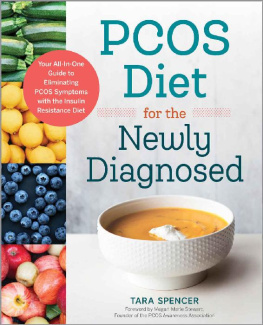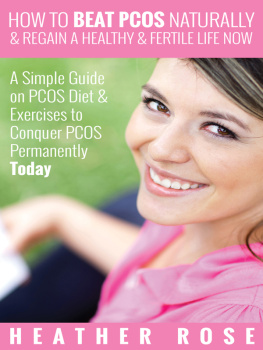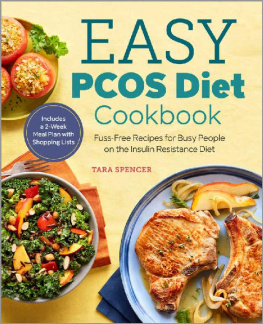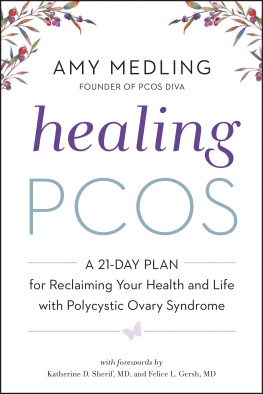PCOS Diet for Beginners
Easy Guide to lose Weight and control the PCOS symptoms with over 100 recipes to improve your Fertility, Boost Metabolism, Control Diabetes and Heal with Insulin Resistance Diet
By
Adele Tyler
Copyright 2020 by Adele Tyler - All rights reserved.
This document is geared towards providing exact and reliable information in regards to the topic and issue covered. The publication is sold with the idea that the publisher is not required to render accounting, officially permitted, or otherwise, qualified services. If advice is necessary, legal or professional, a practiced individual in the profession should be ordered.
- From a Declaration of Principles which was accepted and approved equally by a Committee of the American Bar Association and a Committee of Publishers and Associations.
In no way is it legal to reproduce, duplicate, or transmit any part of this document in either electronic means or in printed format. Recording of this publication is strictly prohibited and any storage of this document is not allowed unless with written permission from the publisher. All rights reserved.
The information provided herein is stated to be truthful and consistent, in that any liability, in terms of inattention or otherwise, by any usage or abuse of any policies, processes, or directions contained within is the solitary and utter responsibility of the recipient reader. Under no circumstances will any legal responsibility or blame be held against the publisher for any reparation, damages, or monetary loss due to the information herein, either directly or indirectly.
Respective authors own all copyrights not held by the publisher.
The information herein is offered for informational purposes solely, and is universal as so. The presentation of the information is without contract or any type of guarantee assurance.
The trademarks that are used are without any consent, and the publication of the trademark is without permission or backing by the trademark owner. All trademarks and brands within this book are for clarifying purposes only and are the owned by the owners themselves, not affiliated with this document.
Table of Contents
Introduction
Polycystic ovary syndrome (PCOS) has become a common syndrome among females. It is a hormone imbalance affecting women during reproductive age (15-44 years). Between 2.2 and 26.7% of women in this age group have PCOS.
Women with PCOS may have rare or prolonged menstrual cycles or excess male hormone (androgen) levels. Ovaries produce numerous small fluid collections (follicles) and fail to release eggs regularly.
PCOS's exact cause is unknown. Early treatment with proper diet and weight loss will reduce the risk of long-term problems such as heart disease and type 2 disease.
This book will address diet in PCOS and include realistic tips for meal planning.
PCOS's exact cause is unknown. Aspects that may play a significant part include:
Excess Insulin: Insulin is the pancreatic hormone that allows cells to use sugar, your body's leading source of energy. If your cells become insulin-resistant, your blood glucose levels may rise, and your body may produce more insulin. Excess insulin can boost androgen production, causing ovulation difficulty.
Low-inflammation: This term implies white blood cells producing infection-fighting substances. Studies found that women with PCOS have low-grade inflammation that causes polycystic ovaries to produce androgens, which can cause heart and blood vessel problems.
Inheritance. Research suggests relating specific genes to PCOS.
- Androgen. Ovaries contain abnormally high androgen levels, resulting in hirsutism and acne.
Until recently, the diet was not considered a significant treatment option. However, since the relatively recent research suggested that insulin resistance plays a role, many experts now believe that diet should be part of the treatment plan. Diet is supposed to help reduce insulin resistance, which can not only benefit irregular menstruation, hirsutism, and acne but also reduce the risk of heart disease and diabetes.
Diet and workout are components of PCOS (Polycystic Ovary Syndrome). It is because young people with PCOS also have elevated serum insulin (a hormone) rates, and often have difficulty keeping a healthy weight. Understanding the best diet and the kinds of food to skip can improve your mood and help you lose weight. Eating regularly, remaining active, and keeping a good weight (or even reducing a slight amount if overweight) will boost the effects of PCOS.
As every balanced eating program, your meals will include a variety of vegetables, fruits, whole grains, plant protein, lean meats, and healthy fats. Most foods fit into a balanced PCOS eating plan, but you can read food labels to help you make better choices. Look for high-fiber grains like brown rice, whole-wheat pasta, and whole-wheat bread rather than low-fiber grains like white rice, pasta, or white bread.
Besides eating, how much you eat also affects your insulin levels. For example, your insulin will go much higher if you have three pasta cups than if you have one pasta cup. Usually, having several small meals and snacks during the day is better than having some huge meals. Tiny portions of meals keep your insulin level lower all day.
Just gaining some control over your choices, and recognizing that all it takes is to make a few reasonable adjustments to your eating approach and movement level can make a huge difference in your health every day.
Considering the importance of the PCOS Diet, this book will help you understand PCOS Diet with over 100 recipes included in the last chapters.
Chapter 1: Introduction to PCOS Diet and Its Effects
As discussed earlier, diet is considered one of PCOS' care choices; this chapter will emphasize the value of food and exercise for PCOS patients.
The androgen rates and inflammation come as a side-package of PCOS that can be tackled by lifestyle improvements such as healthy eating and exercise.
Let's discuss in detail in the upcoming units.
1.1 Role of Insulin Resistance in PCOS and Other Health Problems
Polycystic ovary syndrome (PCOS) sounds like it's an ovary disease, but it's not. Although PCOS influences ovaries and ovulation, it is a full-body endocrine and metabolic disease strongly related to insulin resistance.
Hormone insulin increases slightly after meals in usual circumstances. It stimulates blood sugar from the liver and muscles and converts it to energy. That causes blood sugar to fall, then insulin to fall. With normal insulin sensitivity, sugar and insulin are standard on a blood test.
With insulin resistance, blood sugar may be regular but high insulin. Why? Because the pancreas has more and more insulin to try to get through its message. Too much insulin causes inflammation and weight gain. It can also cause type 2 diabetes and heart disease. Too much insulin also drives PCOS physiologically.
Insulin resistance is the key to obesity and PCOS. It occurs in 70-95% of people with obesity and 30-75% of people with PCOS.
High insulin isn't just a symptom of PCOS it's also a significant condition driver. High insulin will inhibit ovulation, causing excess testosterone in the ovaries. One research showed that a spike in PCOS coincides with an increase in obesity and weight gain during the last ten years. Another research identified a galloping rise of PCOS in parallel with increasing Type 2 diabetes prevalence.
Your blood sugar level increases after you eat. It goes up most after you consume or drink carbohydrate-containing stuff.
It's not entirely clear why and how PCOS develops, but most experts agree that insulin plays a significant role. Insulin is a powerful hormone released by the body's pancreas to eat food, mainly carbohydrates. It transfers sugar from the blood to skin, fat, and liver cells, where it is transformed into energy or deposited as fat.

